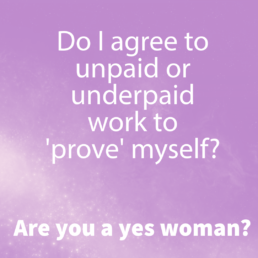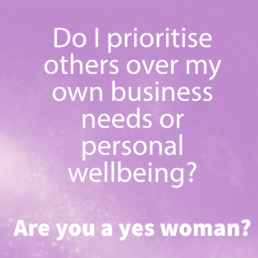Just because you can, doesn’t mean you should : why women must rethink the default yes
For many women, saying no doesn’t come easily, whether in business, work, or personal life. The expectation to be helpful, accommodating, and always available is deeply ingrained. But constantly saying yes can lead to overcommitment, resentment, and even burnout.

Just because you can, doesn’t mean you should
One of the most compelling recent studies on setting boundaries came from four female scientists who decided to track their refusals. Faced with unsustainable workloads, they committed to collective action, agreeing to say no to 100 work-related requests over a year, documenting their experiences along the way. What they discovered was transformative.
Keeping a record of every acceptance and rejection made it easier to identify patterns: how often they agreed to things they later regretted, and what kinds of commitments truly served their goals. They found that a firm no was far more effective than a vague or delayed refusal, which often led to bigger asks later. Giving themselves time before responding also proved valuable; instead of defaulting to yes, they learned to pause and assess whether a request aligned with their priorities.
Importantly, they also recognised how guilt and obligation can cloud decision-making, seeing that saying no wasn’t about letting others down, it was about protecting their ability to focus on what mattered most. Their experiment was so effective that they’ve now increased their target, each aiming for 100 refusals per year reinforcing that boundary-setting is an ongoing skill, not a one-off action【3】
Practical strategies for solopreneurs and consultants
In business, setting clear boundaries isn’t just about self-care, it’s a professional necessity, positioning you as a professional with clear boundaries. Here’s how to make it work:
- Set a ‘no’ quota: Notice how many requests you accept and later regret and use this as a baseline and commit to turning down a set number of non-essential asks each month.
- Price and scope with confidence: Avoid discounting or over-delivering out of guilt—your time is valuable.
- Use a ‘pause’ rule: Before committing, ask yourself: Does this serve my business goals? Am I saying yes for the right reasons?
- Redirect when possible: If a request isn’t right for you, suggest another provider instead of feeling obligated.
- Prepare set responses: Having go-to phrases makes declining easier, e.g., “I’d love to help, but my capacity is full right now.”
The personal impact: when the ‘yes’ culture spills into home life
The tendency to overcommit isn’t just a business issue. Women, particularly those balancing self-employment with caregiving, are also more likely to pick up the domestic slack. Research consistently shows that women take on a disproportionate share of unpaid household labour, even when working full-time or running a business【3】. Saying no to one more client demand means little if you’re still shouldering 100% of the household admin.
Setting boundaries at home can be just as important as setting them in business. Delegating tasks, renegotiating household expectations, and being clear about what is (and isn’t) manageable helps ensure that saying no in one area isn’t just adding pressure elsewhere.
Creating a culture where no is normal
Workplace culture plays a crucial role in normalising boundary-setting. Leaders and organisations can support this by distributing tasks fairly, ensuring that “office housework” isn’t disproportionately assigned to women, and fostering environments where saying no is respected rather than penalised.
Solopreneurs and small business owners don’t have anyone else to intervene and protect their workload, which makes setting personal boundaries even more essential. The reality is, saying yes to the wrong things means saying no to the right things.
But ultimately, it’s also about women taking ownership of their boundaries. Saying no isn’t about shutting down opportunities, it’s about creating space for the right ones. It’s about prioritising well-being and recognising that no one can do everything; it’s about valuing ourselves, our energy, and the businesses we are building.
At Lumin, we believe in building networks where women can support each other in setting boundaries, sharing experiences, and navigating these challenges. Learning to say no isn’t just an individual act, it’s a collective shift towards valuing our ambitions and supporting those of others.
Also worth revisiting is our recent feature on why women’s fatigue so often goes unseen. Because when we always say yes, we also say no — to ourselves【4】.
References:
【1】O’Brien, Katharine Ridgway (2014) “Gender Differences in Reactions to Work Refusals: Implications for Workplace Equity.” Rice University Repository.
【2】Siders, A. R., et al. (2022). “The Year of 100 Nos: Tracking Rejections to Understand Workload Management.” Nature.
【3】Financial Times. “Why women need to master the art of saying no.”
【4】Office for National Statistics (2022). “Unpaid Work and Care in the UK.”
【5】Lumin Feature: “Pulling Back the Veil on Hidden Fatigue.”

At Lumin, we believe in the power of collaboration and shared knowledge. That’s why we’re working to create a trusted space where women solopreneurs and professionals can connect, share experiences, and access the collective wisdom of a multi-generational network. Whether you’re just starting out or pivoting into new opportunities later in your career, we’re here to support your journey.
Stay tuned as we continue shaping our vision for a collaborative, empowering community designed by and for women who want to build their businesses together. Keep updated and inspired : let us know you’re interested
#WomenMentoringWomen #WomenandBurnout #Solopreneurs #WomenInBusiness #Entrepreneurship #WomenSupportingWomen #SmallBusinessTips #CollaborativeEntrepreneurship
Author

This is LUMIN
Editorial from our writers and contributors towards our common goal: raising awareness of the issues that matter to women who want to drive greater success for all, in the world of work and in business
Related Posts
rethinking success: women, business & purpose
Can women lead the way in redefining business success? Not just as participants…
07/03/2025business,mission,entrepreneurswomen in business,Purpose driven,redefining success,Business for good,RSA,Professor SIr John Kay,Royal Society for the Arts
the work-life balancing illusion
We talk a lot about work-life balance, but for many women, the ‘life’ side of…
07/03/2025life,wellbeing,careerswomen entrepreneurs,work-life balance,burnout,solopreneurship,gender equity,domestic load,productivity,sustainability,multitasking myth
tackling the march of macho leadership
The march of macho leadership seems unstoppable. How can we foster genuine…
26/02/2025mission,careersleadership,women in leadership,Vladimir Putin,Donald Trump,Elon Musk,Signalling Authenticity,dictatorships











In employment, this often translates to taking on extra tasks that don’t advance careers through activities that benefit others but don’t advance their own careers, like organising events or managing office morale. Women are more likely to say yes to these tasks, often at the expense of their own priorities, with researchers finding that when women do say no, they tend to experience more negative reactions than men, reinforcing the pressure to comply.
For solopreneurs, consultants, and small business owners, the pressure comes in different ways.
The reluctance to say no isn’t just about workload, it’s often tied to fear. Fear of missing out on an opportunity, of damaging a client relationship, or of being seen as difficult.
Research from Rice University sheds light on this. Across three studies, researchers examined not only whether women decline requests less frequently than men but also why this pattern persists and what can help to create change.
The findings suggest that both men and women tend to prefer individuals, and especially women, who rarely refuse requests, reinforcing the expectation that women should be accommodating. To counteract this dynamic, the research highlights the importance of developing effective refusal strategies that allow individuals to maintain professional relationships while asserting their limits. By learning to say no in ways that balance clarity and diplomacy, the researchers suggest women can push back on expectations and reclaim control over their time.